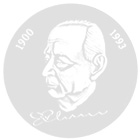for the first theoretically exact formulation of the sampling theorem.
The Sampling Theorem – An Essential Element of Digital Communications Technology
Voice, music, images, television shows are all examples of naturally observable phenomena that increasingly are being digitally processed, stored and transmitted. The classic example has been the replacement of the “analog” long-playing record by the “digital” compact disc, or CD. Noise immunity and fidelity have benefited tremendously because the sound signal is no longer stored as a delicate engraving of record grooves but as a much more robust sequence of numbers. This numerical sequence is obtained by sampling the sound signal amplitude at regular and very short intervals. The sampling values obtained in this way (for CDs, some 44,000 every second) are stored in the CD as a rounded-off binary numerical sequence, otherwise known as “bits”.
What the sampling theorem does is to predict that the original signal can be retrieved without error from the sampling values and to outline how this is done. (The number of sampling values obtained per second must be at least twice as great as the highest frequency occuring in the analog signal.)
The sampling theorem was not presented to a broader audience until 1948 by C. E. Shannon, the 1991 Eduard Rhein laureate. However, Shannon himself cited earlier publications. When these references are review, one can state with certainty today that the Russian scientist Vladimir A.Kotelnikov (born 6 September 1908 in Kasan, a city on the Volga river) in 1933 was the first to formulate in a mathematically exact manner and publish the sampling theorem within the context of problems in communication technology. However, this publication in the proceedings of a Soviet conference has remained largely unknown in the West.
Vladimir A. Kotelnikov did become known among theoreticians of communications technology World wide through his work on noise-immune signal transmission in 1947. In the 1950s and I 960s, he played a leading role in solving the communication issues of the Soviet satellite program. Subsequently he researched problems in radio and radar astronomy. Today he is considered the elder statesman of Russian communication technology.
In view the central significance of the sampling theorem for the whole of modern communication technology, Prof. Vladimir A. Kotelnikov, Member of the Russian Academy of Sciences, is awarded the Eduard Rhein Basic Research Prize in 1999.
Prof. Dr. Hans Dieter Lüke, RWTH Aachen
